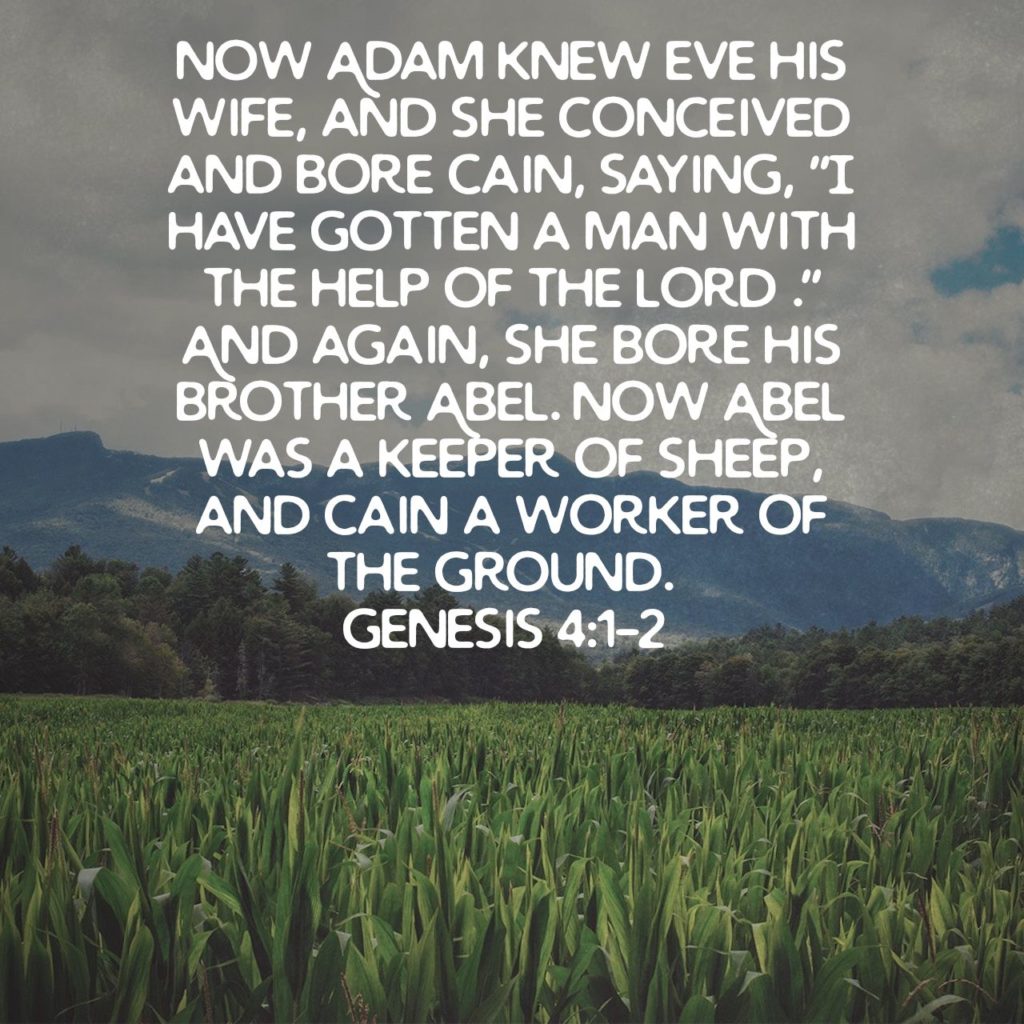
1 Now Adam knew Eve his wife, and she conceived and bore Cain, saying, “I have gotten a man with the help of the LORD.” 2 And again, she bore his brother Abel. Now Abel was a keeper of sheep, and Cain a worker of the ground.
Having been banished from Eden, Adam and Eve have been removed from God’s presence. However they are not abandoned by Him. When Eve gives birth to her firstborn, Cain, she praises God for helping her. Rather than accuse God of making childbirth so painful, her punishment for her rebellion, she thanks Him for allowing her to persevere through it.
The name Cain is reminiscent of the Hebrew word qanah, which means to create, to build, or to produce. This is the first of many biblical names given that reflect a characteristic of the person, as Cain will go on to be a builder of cities.
Abel, the second born, is not given as clear of a name, although it is similar to the word for “herdsman” perhaps suggesting his occupation.
The two brothers take on different roles, Cain working crops, Abel keeping animals. Both of these roles were ones that Adam had to fill previously, now he divides the work between his sons.
3 In the course of time Cain brought to the LORD an offering of the fruit of the ground, 4 and Abel also brought of the firstborn of his flock and of their fat portions. And the LORD had regard for Abel and his offering, 5 but for Cain and his offering he had no regard. So Cain was very angry, and his face fell.
This is the first true offering or sacrifice described in Scripture. While it is almost certain that Adam and Eve offered sacrifices, they are not depicted. It is worth noting that rather than continue to rebel against God, Adam and Eve are raising their children to worship God.
Abel’s offering is found pleasing to God, while Cain’s is not. This is not because animal sacrifice was more pleasing to God, as later in Scripture God also calls for sacrifices of grain and fruit. Rather it is the difference in how the sacrifice was chosen. Abel sacrifices the firstborn of his flocks, perhaps with no guarantee of any other animals to be born. It is a risk. Cain brings “an offering of fruit” not the first fruits, not the first harvest, just some of the fruit he has gathered, likely ensuring that he will have enough to feed his family. It is less risky, and thus less of a sacrifice.
However, Cain is angry that God does not accept his offering. How did God show his acceptance? We do not know, perhaps He spoke, perhaps there was a sign.
6 The LORD said to Cain, “Why are you angry, and why has your face fallen? 7 If you do well, will you not be accepted? And if you do not do well, sin is crouching at the door. Its desire is contrary to you, but you must rule over it.”
God speaks to Cain. This is an important thing to notice. Cain was born outside of God’s presence. Mankind has been separated from God. Yet God still speaks to them.
God graciously tells Cain that though his sacrifice was not acceptable, he can do better, and God wants him to do better. He wants Cain to succeed, and He warns him that sin, laziness, and anger, are waiting to overtake him.
8 Cain spoke to Abel his brother. And when they were in the field, Cain rose up against his brother Abel and killed him.
Cain does not listen to God voice or God’s warning, but rather gives into sin. He murders his brother, and becomes the first murderer. By todays standard, Cain’s attack on his brother fills all the requirements for first degree murder. It is premeditated (he invites Abel to the field), with a motive (jealousy, ager, etc.) and without a just cause (jealousy and anger, while definitely motives, are hardly good reasons to kill someone).
9 Then the LORD said to Cain, “Where is Abel your brother?” He said, “I do not know; am I my brother’s keeper?”
God speaks to Cain, and echoing His speech to Adam after the fall, asks where Abel is. God knows that Abel is dead, and He is giving Cain a chance to come clean.
Rather than come clean, or make some excuse, Cain responds defiantly, lying as he says “I don’t know, am I my brother’s keeper?” He tries to hide his guilt from God. It does not work.
10 And the LORD said, “What have you done? The voice of your brother’s blood is crying to me from the ground.
God reveals that he knows exactly what happened, and with Cain’s defiant answer, He is about to deliver judgment.
11 And now you are cursed from the ground, which has opened its mouth to receive your brother’s blood from your hand. 12 When you work the ground, it shall no longer yield to you its strength. You shall be a fugitive and a wanderer on the earth.”
God takes away Cain’s purpose in life, He takes away his work. Cain was a worker of the fields, now the fields will not longer grow under Cain’s care. In a sense Cain has lost his identity, Cain has lost himself. No longer being able to work, and being wanted for murder, Cain is cursed to wander the earth, with no friends, and no allies.
13 Cain said to the LORD, “My punishment is greater than I can bear. 14 Behold, you have driven me today away from the ground, and from your face I shall be hidden. I shall be a fugitive and a wanderer on the earth, and whoever finds me will kill me.” 15 Then the LORD said to him, “Not so! If anyone kills Cain, vengeance shall be taken on him sevenfold.” And the LORD put a mark on Cain, lest any who found him should attack him.
Cain realizes immediately the severity of his punishment. He is losing his livelihood, he is going to be driven even further from God’s presence, and he assumes, that people are going to want to kill him to avenge Abel.
However, God seeks to stop the cycle of violence before it begins. In an act of pure mercy, God not only marks Cain to keep him safe, but promises to avenge the death of Cain seven times over. God is willing to defend the world’s first murderer out of love. This is a depiction of grace and mercy even in the face of severe punishment. If God is willing to go to such lengths for Cain, how much further will he go for those who seek Him?
16 Then Cain went away from the presence of the LORD and settled in the land of Nod, east of Eden.
Cain leaves the presence of God, perhaps never to experience it again, a sad reality of those who sin. He leaves his homeland and settles away from other people, in the land of Nod.
17 Cain knew his wife, and she conceived and bore Enoch. When he built a city, he called the name of the city after the name of his son, Enoch.
“Where did Cain’s wife come from?” This is the inevitable question that always pops up when people read this passage. There are a few options, only one of which makes perfect sense:
- Some claim that there could of been other people, besides Adam and Eve, who lived outside of Eden. This is nonsense. Why would God only have Adam, and then later Eve in Eden if there was a human population outside of Eden? Why would humans other than Adam and Eve be affected by the fall? Why was Eve, meaning “the mother of all living” given as the name for Adam’s wife if there were other living humans at that time? It makes no sense in the terms of the narrative.
- Another idea is that God created more people outside of Eden after the fall to aid Adam and Eve, as well as provide a wife for Cain, and his brothers. But if God was going to create more humans, why not just start over with the human race? This also seems like a large hoop to jump through.
- The simplest and most likely answer is that Adam and Eve had many Children in their 900 years of life, and that Cain’s wife was one of them, making her Cain’s sister as well. This is uncomfortable to the modern western mind, but the truth is if you are the only people on the planet, such restrictions do not matter. It is not until Moses that God specifically forbids relationships between immediate family members.
They have Enoch, and when Cain builds a city (there isn’t much else that he could do since he can no longer work the ground) he calls it Enoch, after his son.
18 To Enoch was born Irad, and Irad fathered Mehujael, and Mehujael fathered Methushael, and Methushael fathered Lamech. 19 And Lamech took two wives. The name of the one was Adah, and the name of the other Zillah. 20 Adah bore Jabal; he was the father of those who dwell in tents and have livestock. 21 His brother’s name was Jubal; he was the father of all those who play the lyre and pipe. 22 Zillah also bore Tubal-cain; he was the forger of all instruments of bronze and iron. The sister of Tubal-cain was Naamah.
The narrative takes a quick trip down Cain’s family tree, and notes some notable descendants. In paticular the sons of Lamech: Jabal, Jubal, and Tubal-Cain, are noted as inventors of various crafts, Jabal originates the nomadic herding lifestyle, Jubal creates music and songs, and Tubal-Cain develops industry. Within one generation the roles of farmer, entertainer, and tradesman are developed.
23 Lamech said to his wives:
“Adah and Zillah, hear my voice;
you wives of Lamech, listen to what I say:
I have killed a man for wounding me,
a young man for striking me.
24 If Cain’s revenge is sevenfold,
then Lamech’s is seventy-sevenfold.”
Lamech also illustrates Cain’s legacy of violence. Five generations away from Cain, Lamech kills a young man for hitting him. The Hebrew word for young man used here quite literally means “child” or “boy,” suggesting that Lamech killed someone who was very young. Rather than feel guilty, Lamech thinks his act of violence was justified, and claims for himself vengeance seventy-seven times, much more than Cain’s seven times. It is a glimpse into how much humanity has fallen.
25 And Adam knew his wife again, and she bore a son and called his name Seth, for she said, “God has appointed for me another offspring instead of Abel, for Cain killed him.”
Sometime after Abel’s death, Eve gives birth to another son, Seth. Seth’s name is the Hebrew word for “to set in place,” suggesting that he was in fact a replacement for Abel. As before, Eve gives thanks to God for this son.
26 To Seth also a son was born, and he called his name Enosh. At that time people began to call upon the name of the LORD.
Seth’s line becomes the primary lineage the Bible deals with. Everyone else ever discussed in Scripture will be a descendant of Seth. With Seth and the subsequent birth of Enosh, people began calling upon the name of YHWH. This suggests that Seth and his family will seek after God, as Abel did before them.
